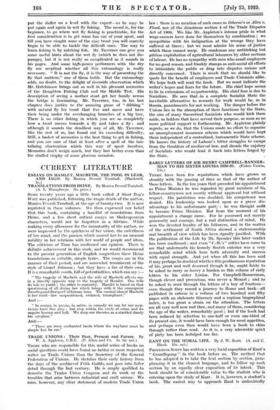CURRENT LITERATURE
TRANSLATIONS FROM HEINE. By Monica Peveril Turnbull. (A. L. Humphreks. No pride.)
SOME- twenty years ago a little book called .4 Short Day's Work was published, following the tragic death of the author, Monica Peveril Turnbull, at the age of twenty-two. It is now
reprinted in these volumes. We then expressed our belief that this book, containing a handful of translations from
Heine, and a few short critical essays on Shakespearean characters, would not be .forgotten in a lifetime. While
making every allowance for the immaturity of the author, we were impressed by the quickness of her vision, the orderliness of her mind, and the passion which moved her to an unusual nobility in her relations with her world of people and ideas. The criticism of Time has confirmed our opinion. There is dCfinite achievement in this work, and we would 'recommend to the present generation of English songwriters these Heine
translations as suitable, simple lyrics. The essays are in the manner of their period, and are somewhat reminiscent of the style of Lionel Johnson ; but they have a fire of their own.
It is a remarkable youth, full of potentialities, which can say :— " The tragedy of Macbeth and the wife of Macbeth affects one in a directly opposite way to the tragedy of Hamlet. One tells its tale to youth ; the other to maturity. Hamlet is based on that questioning of all divine law which brings with it the consequent dwarfingand disregard of human laws. The central idea of Macbeth is law itself—law unquestioned, violated, triuthphant."
And :-
" In essays, in poeins, in satire, in comedy we can let our scep- ticism have free play ; but step within the circle of crime and we require heaven and hell. • We drop our theories as a Startled dandy his eyeglass."
And :— " There are some enchanted lands where the wayfarer must bo simple lost he err."


























































 Previous page
Previous page